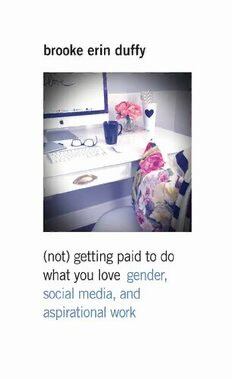
(Not) Getting Paid to Do What You Love: Gender, Social Media, and Aspirational Work PDF
Preview (Not) Getting Paid to Do What You Love: Gender, Social Media, and Aspirational Work
(Not) Getting Paid to Do What You Love This page intentionally left blank ( N OT ) G E T T I N G PA I D TO D O W H AT YO U LOV E GENDER, SOCIAL MEDIA, AND ASPIRATIONAL WORK (cid:68) B R O O K E E R I N D U F F Y New Haven and London Published with assistance from the Mary Cady Tew Memorial Fund. Copyright © 2017 by Brooke Erin Duffy. All rights reserved. This book may not be reproduced, in whole or in part, including illustrations, in any form (beyond that copying permitted by Sections 107 and108 of the U.S. Copyright Law and except by reviewers for the public press), without written permission from the publishers. Yale University Press books may be purchased in quantity for educational, business, or promotional use. For information, please e- mail sales. [email protected] (U.S. offi ce) or [email protected] (U.K. offi ce). Set in Adobe Garamond type by IDS Infotech, Ltd. Printed in the United States of America. ISBN978-0-300-21817-6 (hardcover : alk. paper) Library of Congress Control Number: 2016961763 A catalogue record for this book is available from the British Library. This paper meets the requirements of ANSI/NISO Z39.48-1992 (Permanence of Paper). 10987654321 In Loving Memory of My Dad Daniel Lee Pilszak (1949–2015) This page intentionally left blank Contents Preface ix 1 1 . Entrepreneurial Wishes and Career Dreams 2 . The Aspirational Ethos: Gender, Consumerism, and 12 Labor 3 . (Not) Just for the Fun of It: The Labor of Social 45 Media Production 4 . Branding the Authentic Self: The Commercial Appeal 98 of “Being Real” 5 . “And Now, a Word from Our Sponsor”: Attracting 136 Advertisers, Building Brands, Leveraging (Free) Labor 6 . The “Instagram Filter”: Dispelling the Myths of 185 Entrepreneurial Glamour 7 216 . Aspirational Labor’s (In)Visibility 230 Epilogue: The Aspirational Labor of an Academic 237 Appendix: Method and List of Interview Participants 243 Notes 261 Bibliography 293 Acknowledgments 298 Index This page intentionally left blank Preface Popular rhetoric suggests that social media platforms like Face- book, Twitter, and YouTube have opened the sluice gates of creative expression. The idea is seductive, and it helps to explain the appeal of social media for the legions of young aspirants hoping to break into the creative industries. As a scholar of cultural production, I was intrigued by the promise of self- made careers fashioned online. I had just fi nished a book on the women’s magazine industry, which chronicled producers’ efforts to contain the impending threat of fashion bloggers and other independent voices. Could these social media creators really bypass the legacy companies or, alternatively, harness the currency of their networked “audiences” to land coveted positions in the industry’s ranks? I was curious about the experiences of the (mostly) young women writing the blogs, uploading the videos, and posting to Instagram. Rhetoric aside, I wanted to know how they managed their enterprising ventures, behind the glossy fi lters and curated life- sharing. To what extent were their passion projects paying off ? I decided to ask them. Over a span of three years, I interviewed dozens of social media producers to make sense of their experiences and aspirations. What I found is that the narrative of creative self- expression—touted by the press and projected by the digital aspirants themselves—conceals the unrelenting work (much of it unpaid) that ix
